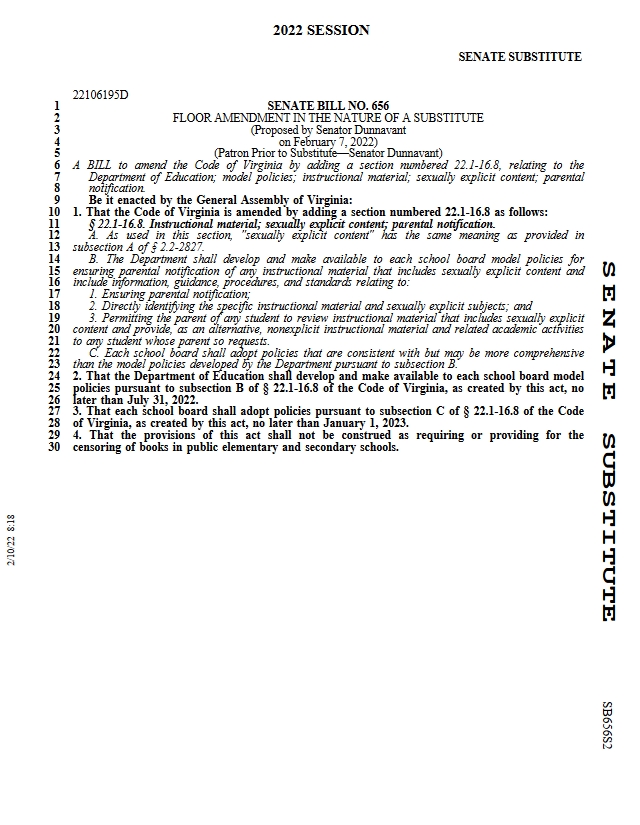See The New Virginia Bill Requiring Teachers Tell Parents When Giving Kids Sexually Explicit Materials
Chris Rufo tweeted out “Winning” in capital letters. Rufo, who is an American conservative activist as well as a senior fellow at the Manhattan Institute, was commenting on the new Virginia Senate Bill 656 that, if fully passed, will require school districts and its teachers to inform parents when they are giving out sexually explicit materials to their kids.

Chris Rufo tweeted out “Winning” in capital letters. Rufo, who is an American conservative activist as well as a senior fellow at the Manhattan Institute, was commenting on the new Virginia Senate Bill 656 that, if fully passed, will require school districts and its teachers to inform parents when they are giving out sexually explicit materials to their kids.
As Rufo notes in his tweet, the Virginia State Senate, this time with the assistance of two Senate Democrats, passed the legislation. Now, curriculum transparency, something parents have been calling for in droves, is looking more likely. The vote on the floor passed by a 20-18 margin, with the two Democrats, Sens. Lynwood Lewis, D-Accomack, and Monty Mason, D-Williamsburg, taking sides with Virginia House Republicans.
As the new bill reads, Virginia will require the Department of Education to first develop policies and then present them to school boards that would ensure district schools would notify parents of any material that would be considered sexually explicit that their kids may be given. These policies would include any information, guidance, standards, and procedures relating to parental notification, identifying directly the sexually explicit material and subjects, allowing parents to review said explicit material, and providing parents/students with nonexplicit alternatives. The bill also calls for school boards to adopt these policies but allows them to be more comprehensive (i.e., strict) than the policies developed. The bill can be seen below.

It may sound like a silly question – Should parents be notified when teachers plan to introduce sexually explicit materials to their kids – but it is actually one that has been up for debate for a while now. Teachers’ unions and teachers themselves continue to push to keep their choices secret while parents, and now the legislature, feel curriculum transparency is needed now more than ever. Virginia isn’t the only state taking up this battle.
At the present time, at least 12 states have introduced one form of legislation concerning curriculum transparency. Some of this legislation is tied to the perceived teaching of the divisive critical race theory being taught in schools presently. Governors of Iowa, Arizona, and Florida have followed Virginia’s Governor Glenn Youngkin on tying these two measures together. On Youngkin’s first day as the Governor of Virginia, he made a splash by signing numerous executive orders to fight these two growing issues.
Other states to try their hand at passing some form of curriculum transparency law to either remove or identify when sexually explicit material will be handed out to kids include Texas, Colorado, Illinois, Michigan, Wisconsin, and Wyoming. The passage of SB 656 is a big victory for Virginia’s Governor. He made it clear from the jump that he wanted parents to have much more say as to what their kids learned in school and how that material was to be presented. The bill, though, divided the Virginia House almost down the middle.
Proponents of the bill claim the intent is to expand parental oversight. To give parents a larger voice. “This is not about literature, this is about parental notification,” said bill sponsor, Republican Siobhan Dunnavant, via WTOP News. “This bill is something we can all embrace, because it’s about actually making sure tough conversations happen and parents interact with their children on those things.”
But those who oppose the bill are warning that its passage could be used to limit the LGBTQIA2S+ materials that can be used in schools, making it harder for certain students to get access to that information. Some claim this is censorship at its finest, though how removing sexually explicit material from kids falls into that category of censorship is a question yet to be answered. Sen. Ghazala Hashmi, D-Chesterfield says, “The senator has argued this is not a censorship bill, but in fact, this is what it comes from and what it leads to.”
With the passage of SB 656 in the Virginia Senate, the bill requiring the announcement of sexually explicit material directed toward kids is now expected to fly through the Republican-controlled House of Delegates. Once it passes that, it will be sent to Governor Youngkin’s desk for his signature. He can then check off one big promise he made to his constituents on his way to the Virginia Governor’s office.



